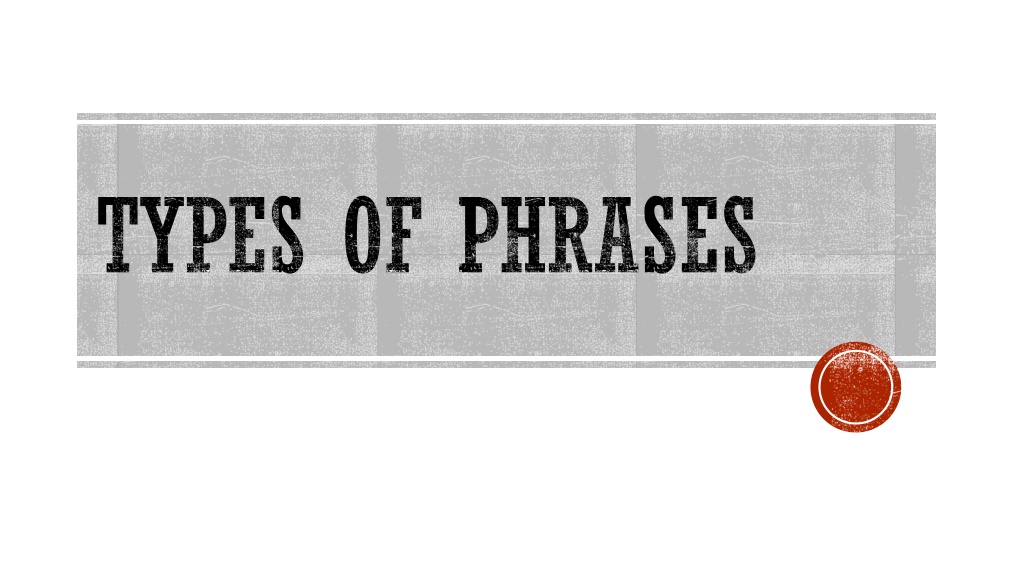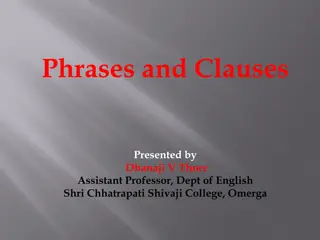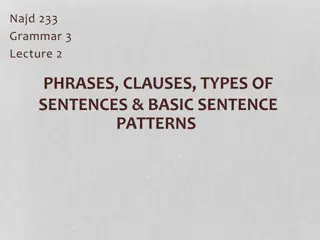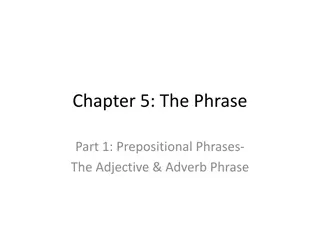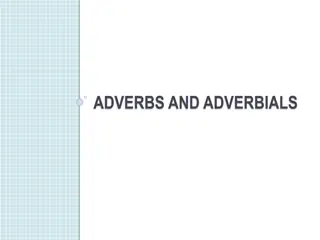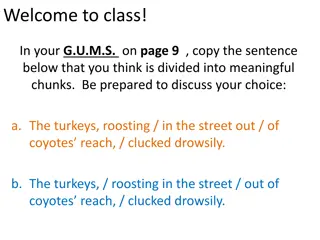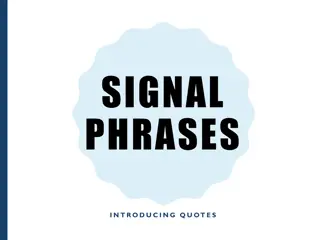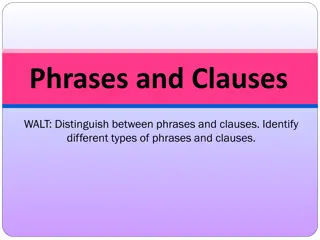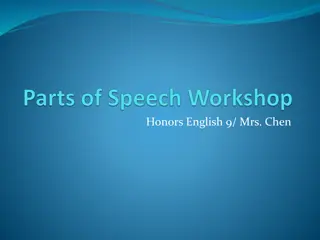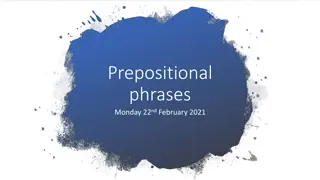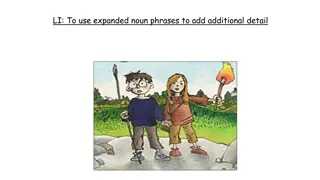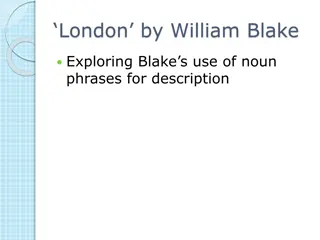Understanding Different Types of Phrases in English Grammar
Explore the various types of phrases in English grammar, including noun phrases and adjectival phrases. Learn how modifiers can come before or after the noun in a phrase, and practice identifying these phrases in sentences. Enhance your understanding of grammar with clear examples and explanations.
Download Presentation

Please find below an Image/Link to download the presentation.
The content on the website is provided AS IS for your information and personal use only. It may not be sold, licensed, or shared on other websites without obtaining consent from the author. Download presentation by click this link. If you encounter any issues during the download, it is possible that the publisher has removed the file from their server.
E N D
Presentation Transcript
NOUN PHRASES A noun phrase includes a noun a person, place, or thing and the modifiers which distinguish it. You can find the noun dog in a sentence, for example, but you don't know which canine the writer means until you consider the entire noun phrase:that dog,Aunt Audrey's dog,the dog on the sofa,the neighbor's dog that chases our cat,the dog digging in the new flower bed.
NOUN PHRASES Modifiers can come before or after the noun. Ones that come before might include articles, possessive nouns, possessive pronouns, adjectives, and/or participles. Articles: a dog, the dog Possessive nouns: Aunt Audrey's dog, the neighbor's dog, the police officer's dog Possessive pronouns: our dog, her dog, their dog Adjectives: that dog, the big dog, the spotted dog Participles: the drooling dog, the barking dog, the well trained dog Modifiers that come after the noun might include prepositional phrases, adjective clauses, participle phrases, and/or infinitives. Prepositional phrases: a dog on the loose, the dog in the front seat, the dog behind the fence Adjective clauses: the dog that chases cats, the dog that looks lost, the dog that won the championship Participle phrases: the dog whining for a treat, the dog clipped at the grooming salon, the dog walked daily Infinitives: the dog to catch, the dog to train, the dog to adopt
PRACTICE: IDENTIFY THE NOUN PHRASES IN THE SENTENCES BELOW. The old gray mare limped down the lane. The silver-winged plane soared. Johnny s baby sister cried for hours. The first three girls giggled. Fourteen good pilots died in the war. The chairman of the meeting left early. The chrome-plated motorcycles glistened in the sun. The pioneers in our family fled from England. The dog s buried bones rotted in the ground 10. Carol s best china plate broke into a hundred pieces. 1. 2. 3. 4. 5. 6. 7. 8. 9.
ADJECTIVAL PHRASES An adjectival phrase is a phrase that tells us something about the noun it is modifying. The main word in an adjective phrase will be an adjective.
PRACTICE: IDENTIFY THE ADJECTIVAL PHRASES IN THE SENTENCES BELOW. The King wore a crown made of gold. 1. It was an elephant with a white skin. 2. He lived in a house built of stone. 3. There was a pot made of earth on the table. 4. She wore a necklace made of diamond. 5. Much has been said about the scenery of Switzerland. 6. The flag of Spain flew at the top of the mast. 7. That was an act of bravery. 8. That was a night full of horror. 9. 10. Deeds of heroism are worthy of admiration.
VERB PHRASES Just like several words can form the subject of a sentence, the verb can consist of two or more words. This is called a verb phrase. In the sentence below, the verb phrase is, must have gone. The bus must have gone by now. These three words form the complete verb. The word gone is the main verb. It shows the action. Without it, the action of the bus would be unknown. Verb phrases are formed by putting one or more helping verbs in front of a main verb.
PRACTICE: IDENTIFY THE VERB PHRASES IN THE SENTENCES BELOW. The bus must have gone by now. 1. My best friend could not work tonight. 2. The light green grapes have been eaten. 3. The committee of environmentalists is working to solve the smog problem. 4. Steven s aunt is not following her new diet. 5. The old rickety wagon should not have been filled to the top. 6. The merry pied piper would have played a happy tune. 7. A stray sunbeam could have pierced through the clouds. 8. The paint on the old gray house was peeling. 9. 10. The peace treaty might have been signed today.
ADVERBIAL PHRASES: Adverbial phrase is the term for two or more words which play the role of an adverb. An adverbial phrase will answer the questions how, when, or where. Examples: I will sit in silence. The adverbial phrase in silence tells how I will sit. I used to work in a fire-hydrant factory. You couldn't park anywhere near the place. The adverbial phrase anywhere near the place indicates where I couldn t park.
PRACTICE: IDENTIFY THE ADVERBIAL PHRASES IN THE SENTENCES BELOW. We expect our grandparents to arrive in about an hour. My cousin watches television almost as much as you do. The weatherman says it will rain all day. Your brother plays soccer better than my brother does. Our friend drives on Mondays. Stacy and Nancy will walk on the sidewalk. The snake slithers through the tall grass. Mom combs my hair more gently than Dad does. He found his lucky penny in the morning. We raced our toy cars on the playground. 1. 2. 3. 4. 5. 6. 7. 8. 9. 10.
PREPOSITIONAL PHRASES A prepositional phrase will function as an adjective or adverb. As an adjective, the prepositional phrase will answer the question Which one? The book on the bathroom floor is swollen from shower steam. Which book? The one on the bathroom floor! The sweet potatoes in the vegetable bin are green with mold. Which sweet potatoes? The ones forgotten in the vegetable bin! The note from Beverly confessed that she had eaten the leftover pizza. Which note? The one from Beverly! As an adverb, a prepositional phrase will answer questions such as How? When? or Where? Freddy is stiff from yesterday's long football practice. How did Freddy get stiff? From yesterday's long football practice! Before class, Josh begged his friends for a pencil. When did Josh do his begging? Before class! Feeling brave, we tried the Dragon Breath Burritos at Tito's Taco Palace. Where did we eat the spicy food? At Tito's Taco Palace!
PRACTICE: IDENTIFY THE PREPOSITIONAL PHRASES IN THE SENTENCES BELOW. We walked up the stairs. 1. My mom took a walk around the block. 2. I looked under my bed. 3. The girl looked behind the door for her friend. 4. Don t leave without your coat. 5. During lunch we had a basketball tournament. 6. The car traveled at a high speed. 7. For a fraction of the cost you can buy a watermelon. 8. The boy tried to finish the race at any cost. 9. 10. The baseball was just out of reach from the boy.
